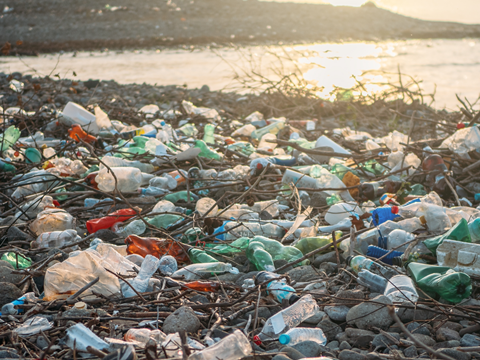
The Business Coalition for a Global Plastics Treaty is pushing for an instrument that prioritizes the ambition of most INC-5 negotiators over voluntary measures with universal support.
Convened by the Ellen MacArthur Foundation and WWF, the Coalition constitutes over 275 businesses and financial institutions and is supported by strategic NGO partners. Its members have their sights set on “concrete outcomes” for a global instrument.
“With only hours left for negotiations, governments must make a choice,” it said in a statement. “They can continue negotiating a treaty with universal support but little impact. Or they can agree on a treaty based on global rules across the full lifecycle of plastics, confident in knowing that this is what the majority of governments, business and civil society wants.
“A treaty based on voluntary measures alone will not end plastic pollution and will only exacerbate the fragmented regulatory environment that business is facing.”
Rob Opsomer, executive lead on Plastics and Finance at the Ellen MacArthur Foundation, reiterates: “As INC-5 unfolds in Busan, the clock is ticking for governments to make a decisive choice. They can settle for a treaty with broad support but little impact, or champion an ambitious agreement that enforces global rules across the full lifecycle of plastics — a solution the majority of governments, businesses, and civil society are calling for.
“Leading governments must step up now to forge a treaty that has the potential to help end plastic pollution.”
The Coalition’s ‘Treaty on a Page’ roadmap uplifts core elements of its Vision Statement as an ‘ambitious starting point’ in developing a treaty that combats plastic pollution. It envisions a strong initial treaty that combines these elements with a process enabling future Conference of the Parties meetings to make revisions and strengthen it further.
“This requires retaining a full lifecycle approach in the Global Plastics Treaty covering all relevant aspects of the UNEA resolution 5/14, without the need to decide on all details in Busan,” the Coalition says. “At INC-5 we need a strong political commitment to put the right structures in place that allow us to develop further work on the immediate priorities, as well as to continuously improve targets and measures to be implemented under the treaty over time.”
Its vision for the treaty includes strong restrictions or phase-outs for ‘problematic’ and avoidable plastics alongside chemicals of concern. Clear criteria and, potentially, initial lists should be introduced to improve product design, the Coalition argues.
It continues to assert that introducing or advancing national targets and systems for collection, reuse, and recycling should be mandatory. They should be developed in line with common definitions and key principles for such policy instruments as Deposit Return Systems and Extended Producer Responsibility regulations.
In the Coalition’s view, the treaty’s implementation should be supported by a comprehensive package. This should involve financial flows that reinforce the treaty’s objectives, as well as public and private support for a just transition into circularity. Workers, enterprises, and communities should be offered ‘decent work opportunities in the plastics value chain’.
Developing sector-specific programmes of work to inform future Conference of the Parties (COP) decisions should be mandatory, the statement says. These are set to cover any additional control measures required and provide further guidance on their implementation.
They should be geared towards ‘plastic applications where there is sufficient alignment’, starting with packaging and fishing gear.
The Coalition concludes that the treaty’s effectiveness should be regularly reported on, monitored, and evaluated via a sound mechanism. A governing body of the treaty could possible strengthen policy measures over time, it adds.
“We know that a voluntary, fragmented and non-specific set of policy measures determined differently in each country will add significant barriers and costs to implement the necessary changes at scale,” the Coalition says. “Businesses want a legally binding treaty that tackles the entire lifecycle of plastic products, underpinned by harmonized regulation.”
Ahead of INC-5, it published an open letter to Heads of State calling on governments to address plastic pollution at a global level. This is hoped to harmonize the policy landscape, strengthen national legislation, and help businesses scale proven solutions for packaging and other priority sectors.
Negotiations kicked off in Busan this week and were met with frustration as progress stalled – an outcome WWF blames on a minority of nations pushing for a “watered-down” treaty. In response, INC Chair Luis Vayas Valdivieso was expected to revise the treaty text as early as this afternoon (29th November).
For a full rundown on proceedings from INC-1 to INC-5, take a look at our comprehensive guide in a recent edition of the Brief.
If you liked this story, you might also enjoy:
The ultimate guide to the Packaging and Packaging Waste Regulation in 2024
How are the top brands progressing on packaging sustainability?
Sustainable Innovation Report 2024: Current trends and future priorities
Everything you need to know about global plastic sustainability regulation














No comments yet